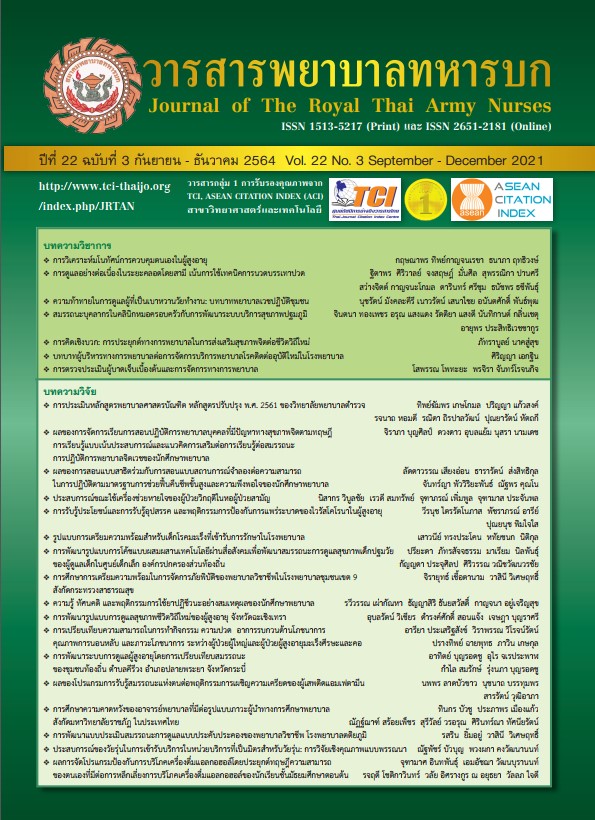The Effects of Demonstration Teaching Method Combined with SimulationBased Learning Method on Nursing Students Ability to Perform Based on the Advanced Cardiovascular Life Support Standards and Satisfaction
Keywords:
Demonstration Teaching method, Simulation-Based Learning method, Advanced Cardiovascular Life Support, Learner Satisfaction, Nursing StudentsAbstract
This quasi-experimental research examined the effects of demonstration teaching method combined with simulation-based learning on nursing students’ ability to perform according to advanced cardiovascular life support standards and their satisfaction on the teaching. The samples of this study were 80 third-year students from Bachelor of Nursing program that were divided into 40 students for an experimental and 40 students for a controlled group. The instruments included : (1) the general data questionnaire (2) the satisfaction questionnaire toward the teaching, (CVI value of .87) (3) the ability test on the advanced cardiovascular life support for critically ill patients, (CVI value of .83). and (4) the simulation case of critically ill patients and virtual simulation models. The statistics employed for this analysis were percentile, medium, standard deviation and t-test.
The research results showed that: (1) the average score of nursing students’ ability to follow standard of resuscitation was significantly higher after learning through demonstration and simulation-based learning (significance level at .001); (2) according to the average score, the ability of the nursing students learnt through demonstration and simulation-based learning method to comply with the resuscitation standards was higher than that of those experienced normal methods (significance level at .001); and (3) the average score of overall nursing students’ satisfaction learnt through demonstration and simulation-based learning was the highest.
Downloads
References
Punthasee, P. Sikaow, O. The Effect of Clinical Teaching by Using Case Studies on the Ability Development of Applying Nursing Process in Clinical Practice of Nursing Students. Thai Journal of Nursing Council. 2009 ; 24(3) : 81-93. (In Thai).
Academic Department of Christian University. Evaluation of teaching and learning Management; 2018. (In Thai).
Boonmak, P. & Boonmak. S. Medical Simulation the way to improve patient care. Srinagarind Medicine Journal. 2013 ; 28 (Suppl) : 80-5. (In Thai).
Cant, R.P., & Cooper, S.J. Use of simulation-based learning in undergraduate nurse education : An umbrella systematic review. Nurse education today. 2017 ; 49: 63-71.
Khalaila, R. Simulation in Nursing Education : an Evaluation of Students’ Outcomes at Their First Clinical Practice Combined with Simulations. Nurse. Education Today. 2014; 34: 252-8.
Bandura, A. Social cognitive theory: An agentic perspective. Annual review of Psychology. 52. Palo Alto : Annual Reviews Inc ; 2001.
Sirikul, T., Werathammo, A., & Khattiyamarn, W. Effects of Teaching Management with an Integration of Demonstration, Scenario, and Group Discussion on Knowledge, Skills, and Problem-Solving Regarding Emergency Medical Care Among Students of Sirindhorn College of Public Health, Yala. The Southern College Network Journal of Nursing and Public Health, 2016 ; 3(2) : 53-69. (In Thai).
Kumkong, M., Leejareon, P., Aramrom, Y., & Jitviboon, A. Effects of Simulation-Based Learning on Perceived Self-Efficacy in Providing Nursing Care for Advanced Life Support to Patients with Critical Illness or Emergency Condition among Nursing Students. The Southern College Network Journal of Nursing and Public Health. 2016; 3(3) : 52-64. (In Thai).
Announcement of the Ministry of Education. Subject : Bachelor’s degree qualification standards Nursing Science. Announced on 6th November 2017 (In Thai).
Thanormchayathawat, B., Vanitsuppavong, P., Niemted, W.,& Portjanatanti, N. 21st Century Skills: A Challenge for Student Development. The Southern College Network Journal of Nursing and Public Health. 2016; 3(2) : 208-22. (In Thai).
Cohen, J. Statistical power analysis for the behavioral sciences. Hillsdale, New Jersey: Lawrence Erlbaum Associates ; 1988.
Gupta, K., Attri, JP., Singh, A., Kaur, H., & Kaur, G. Basic concepts for sample size calculation: Critical step for any clinical trials!. Saudi J Anaesth. 2016; 10(3), 328–331.
Davis, L., Chen, J., & Thorpe, M. Predicting the elastic properties of composite mater ia ls . Paper presented at the Proceedings-American Society For Composites ; 1992.
Cronbach, L.J.. Essentials of psychological testing. (3rd ed.). New York : Harper & Row ; 1970.
Laothong, N. Construction of educational research tools. Bangkok : Chulalongkorn University ; 2016.
Lewis, R., Strachan, A., & Smith, M.M. Is High Fidelity Simulation the Most Effective Method for the Development of Non-Technical Skills in Nursing? a Review of the Current Evidence. The Open Nursing Journal. 2012 ; 6 : 82-9.
Wannasri, S., Tantalanukul, S.,& Nawsuwan, K. Comparison video based training program and intensive program for basic cardiopulmonary resuscitation Training In Elementary School Students, Nan. Journal of the Phrae Hospital. 2019; 27(2) : 78-93. (In Thai).
Phormpayak, D., Sattayawong, W., Rattana-Umpa, J., Hamtanon, P., & Rungkavat, V.The Effects of Using Simulation Based Learning and Reflective Thinking SkillPromoting on NursingStudents’ Reflective Thinking Behaviorand Clinical Decision-Making Abilities. The Journal of Baromarajonani College of Nusing, Nakhonratchasima. 2019; 25(2): 57-71. (In Thai).
Kimsungnoun, N. An Effect of Participatory Learning Method in the Subject of Community Health Nursing on Learning Achievement of Nursing Students,School of Nursing, Rangsit University. Journal of Rangsit University : Teaching & Learning. 2014; 8(2):78-89. (In Thai).
Dreifuerst, K. The essentials of debriefing in simulation learning : A concept analysis. Nursing Education Perspectives. 2009 ; 30(2) : 109-14.
Sinthuchai, S. & Ubolwan, K. Fidelity Simulation Based Learning: Implementation to Learning and Teaching Management. Journal of The Royal Thai Army Nurses. 2017; 18(1) : 29-38. (In Thai).
Downloads
Published
How to Cite
Issue
Section
License
บทความหรือข้อคิดเห็นใดใดที่ปรากฏในวารสารพยาบาลทหารบกเป็นวรรณกรรมของผู้เขียน ซึ่งบรรณาธิการหรือสมาคมพยาบาลทหารบก ไม่จำเป็นต้องเห็นด้วย
บทความที่ได้รับการตีพิมพ์เป็นลิขสิทธิ์ของวารสารพยาบาลทหารบก
The ideas and opinions expressed in the Journal of The Royal Thai Army Nurses are those of the authors and not necessarily those
of the editor or Royal Thai Army Nurses Association.






